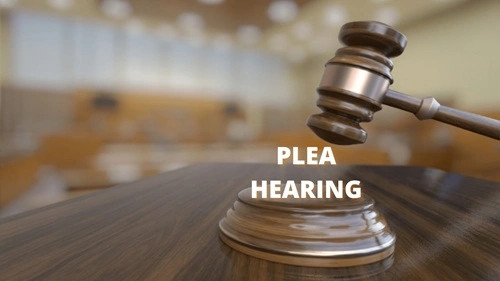When facing criminal charges, one of the most important stages in the process is the plea hearing. It’s the point where you formally enter your plea guilty, not guilty, or no contest before a judge. Many defendants walk into this hearing wondering the same thing: Can I be taken to jail right there in court?
The answer is yes, it’s possible to go to jail at a plea hearing, depending on the type of plea, the severity of the charges, and whether a plea deal has been negotiated. While some people leave court and return home after the hearing, others are taken into custody immediately. Here’s how it works.

What Happens at a Plea Hearing
A plea hearing (also called a “plea colloquy”) is a formal court proceeding where a defendant tells the judge how they wish to plead to the charges filed against them.
During this hearing, the judge will:
- Confirm that you understand your charges and potential penalties.
- Ensure that your plea is voluntary and not coerced.
- Review any plea agreement negotiated between the prosecution and defense.
- Decide whether to accept or reject the plea.
Depending on the case, the plea hearing can result in sentencing the same day or setting a later sentencing date.
Pleading “Not Guilty”
If you plead not guilty, you will not be sentenced at the plea hearing. The court will schedule future dates for pretrial motions, hearings, or trial.
However, even after pleading not guilty, the judge could still order you into custody if:
- You violated previous bail or bond conditions, or
- The prosecution presents evidence that you are a flight risk or danger to the community.
In those cases, the judge might revoke bail and remand you to jail until trial.
Pleading “Guilty” or “No Contest”
When you plead guilty or no contest (nolo contendere), you’re admitting responsibility (or not contesting the charges) and giving up your right to trial. That’s when the possibility of jail becomes very real.
Here’s what can happen:
- If your plea deal includes jail time, you can be taken into custody immediately.
- If the judge accepts your plea but doesn’t agree to the recommended sentence, they can impose a different sentence, including incarceration.
- If you are already out on bail, the court may remand you to custody to begin serving your sentence.
For example, if you plead guilty to a misdemeanor with a 60-day jail sentence, the judge could order you to start serving your time that same day.
Plea Agreements and Sentencing Timing
Most guilty pleas come from plea bargains, where the prosecution and defense agree on reduced charges or penalties in exchange for avoiding trial.
In many cases:
- Sentencing happens immediately after the plea if both sides have agreed to terms.
- For more serious offenses, the judge might delay sentencing to review a pre-sentence investigation report (PSI) prepared by probation officers.
If sentencing is postponed, the judge must decide whether to allow you to remain free on bond or place you in custody while awaiting sentencing.
If you’ve complied with all court orders and your offense is nonviolent, you may be allowed to remain free until your sentencing date. But if the judge believes you might flee or pose a danger, they can order immediate detention.
When Jail Is Most Likely at a Plea Hearing
You’re most likely to be taken to jail at a plea hearing if:
- You plead guilty to a felony or serious misdemeanor.
- The plea agreement includes mandatory jail or prison time.
- You’ve violated bail conditions or have a prior criminal record.
- The judge believes you are not likely to appear at sentencing.
- Your plea involves violent, sexual, or drug-related offenses with mandatory incarceration.
For example:
- A defendant pleading guilty to a DUI with injury, domestic violence, or drug trafficking charge could be remanded immediately.
- Someone pleading guilty to theft or low-level fraud might receive probation or a delayed sentencing date.
What You Can Do to Prepare
If you expect to enter a guilty or no contest plea, preparation is key:
- Talk to your attorney beforehand about whether your plea will lead to immediate jail time.
- Bring personal items (like medication or ID) in case you are taken into custody.
- Arrange childcare or work coverage before the hearing if jail time is likely.
- Ask your lawyer whether you qualify for alternatives like probation, community service, or suspended sentencing.
Your attorney can also request that the judge delay your surrender date, allowing you time to put personal affairs in order before reporting to jail.
Final Thoughts
So, can you go to jail at a plea hearing? Yes, absolutely. Whether you’re taken into custody depends on your charges, your plea, and the judge’s decision.
If you plead guilty or no contest to a crime that carries jail or prison time, you could be remanded immediately—even if you’ve been out on bond. However, with a skilled defense attorney, you may be able to negotiate a sentence that avoids incarceration or allows voluntary surrender.
A plea hearing is a serious moment in any criminal case. Before stepping into that courtroom, make sure you fully understand what your plea means, what your sentence might be, and whether you could be walking out—or being led away—in handcuffs.

Our dedicated team gathers information from all the reliable sources to make the law accessible and understandable for everyone. We provide the latest legal news stories from across the country, delivered straight to you.
